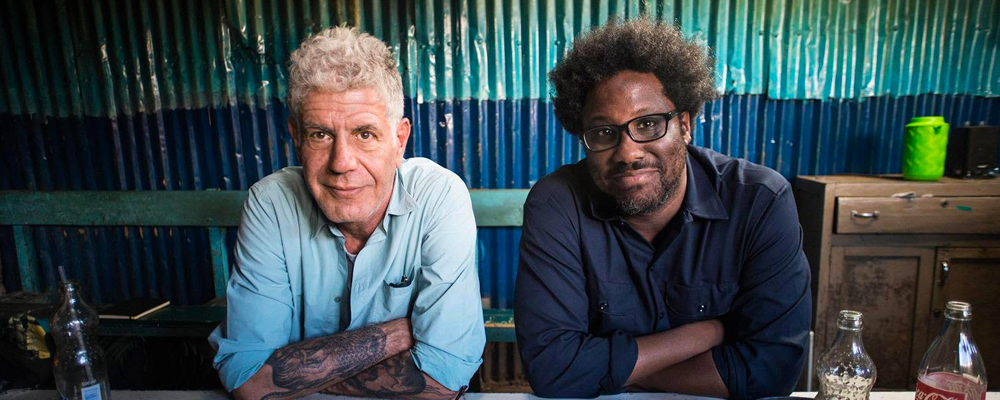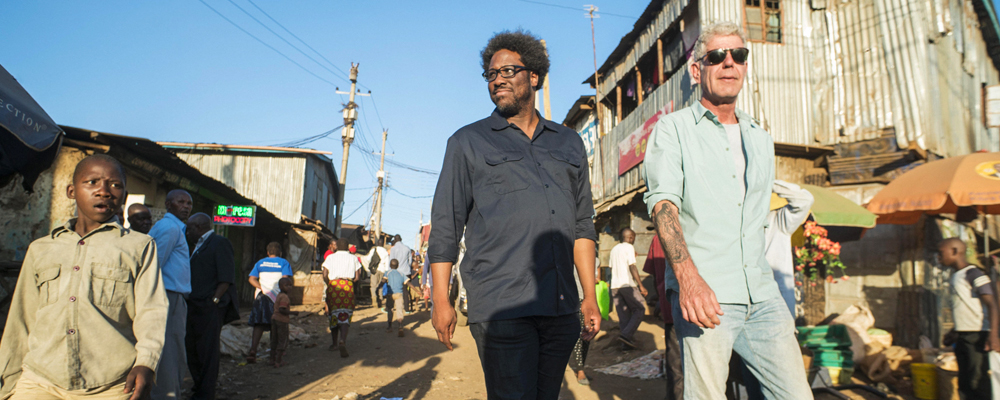‘Parts Unknown’ Season 12 Begins in Kenya With Anthony Bourdain’s Final Narration
Alci Rengifo
When Anthony Bourdain died in June at the age of 61, he left behind a legacy that combined, like no other, a rebelliousness, culinary art and a fierce internationalism. This is made all too clear in the first episode of the 12th and final season of Bourdain’s CNN travel show, “Anthony Bourdain: Parts Unknown.” In an emotive introduction to the first and only episode fully completed before Bourdain’s death, Anderson Cooper reveals that this is the first of five episodes that will make up the final season. After these episodes have aired, CNN will also present two tributes to the chef, author and world wanderer. “Kenya” finds Bourdain in a joyous trip to Nairobi, tasting local flavors but finding great discoveries in meeting the local people.
For the episode Bourdain is joined by comedian and writer W. Kamau Bell, who is known for his work in “United Shades of America” and “Cultureshock.” The two venture into Kenya’s capital, Nairobi in Bell’s his first ever trip to Africa, which he is almost embarrassed to admit considering his advocacy and even his name. Bell was born to parents who were involved in 1970s activism in California, when black communities in places like Palo Alto sought to find greater links to their African roots. The country Bourdain and Bell discover is a mixture of old history and modern innovation as Kenyans still live with the aftershocks of British colonialism. Beyond the stereotypical image of poverty and AIDS, Kenya is a society with a growing middle class and superb education. Bourdain can’t help but take a swipe at our own American president, emphasizing that Kenya is “not a shithole.”
There is of course much to dine and drink in “Kenya,” but as always Bourdain uses the food as a mere gateway into wider, profound observations. While trying grilled tilapia and ugali, Bourdain and Bell discuss Bell’s roots in California, and how East Palo Alto once considered re-naming itself “Nairobi.” Later while sharing some drinks the duo chat with Njeri Gikera, a designer who explains the way free trade policies have gutted Kenya’s own domestic industries. One of the episode’s most stunning revelations is how Kenya is a prime destination for second-hand clothing collected from U.S. donation bins, then shipped to third world countries to be resold. In this episode an important subtext is that many free trade policies are turning poorer countries into forced subservience to U.S. policies. Gikera points out that when Kenya attempted to curtail the import of second-hand clothing via certain import companies, the U.S. threatened the country with sanctions. Bell can only respond with a sarcastic “U.S.A., U.S.A” chant.
The previous season of “Parts Unknown” had ended with a rather meditative, almost melancholic episode (made even more so by Bourdain’s suicide) featuring director Darren Aronofsky as the special guest. In it Bourdain and Aronofsky travelled to Bhutan to reflect on death rituals, isolation from civilization and the onset of global warming. In “Kenya” there is a livelier tone. Even Bourdain’s narration has a special mischievousness to it as he lightly mocks Bell over his inexperience with certain foods. When they sit down for a serving of goat’s head, Bourdain muses, “I eat this kind of thing for breakfast now.” The pair ride local party buses called “matatus,” which are a form of public transportation where for 60 cents you can hop on a “Mad Max”-themed bus decked out with strobes, neon lights and pounding speakers. Bourdain pokes fun at his own network and proposes he open his own matatu in Manhattan called “The Wolf Blitzer.” Bourdain’s jovial, sarcastic wit is on full display here, but always infused with a genuine respect and fascination with whatever place he is exploring.
When Bourdain and Bell are not trying more interesting local flavors, such as cow milk mixed with cow blood, they strive to introduce viewers to the very fabric of Nairobi society. A free boxing school teaches women to become serious fighters, a collective in the working class neighborhood of Kibera tries to introduce locals to the liberating power of art, and a group called To Revolutionary Type Love fights for LGBTQ rights in a country where same-sex relations are still illegal. Bourdain goes beyond the headlines and stereotypes, bridging the desires and drives of his subjects with universal needs and struggles.
The final section of “Kenya” is a beautiful, serene safari into the Lewa Wildlife Conservancy where Bourdain and Bell are allowed to get close to the rhinoceroses and giraffes prowling the plains. We are informed about the ongoing battle against poaching. Throughout Bourdain openly expresses his contempt for what he sees as the intrusion of elites into these parts of the world, lamenting that even local tribes are at times displaced to make way for “rich white people” to come have a safari experience. His anger, as always, is righteous.
It is a bittersweet feeling to begin watching another season of “Parts Unknown,” because this time we know that after the fifth episode, there will be no more, at least with Bourdain. He made the world accessible to millions of viewers through an open and feisty approach. Yet, part of this show’s special power was that a personal tone always fueled the material. As Bourdain says at the end of this episode, “Who gets to tell the stories? This is a question asked often. The answer in this case, for better or for worse, is, I do… at least this time out. I do my best. I look. I listen. But in the end I know it’s my story.”
Season 12 consists of seven episodes, five with Bourdain, including Kenya (the final show narrated by Bourdain), Manhattan’s Lower East Side, Indonesia, Spain’s Asturias region and Texas’s “Big Bend.” The other four pisodes will use narration and interviews by guests that were featured in each episode. The final two episodes of the series are tributes to Bourdain’s life and legacy.
“Anthony Bourdain: Parts Unknown” season 12 premieres Sept. 23 and airs Sundays at 9 p.m. ET on CNN.


